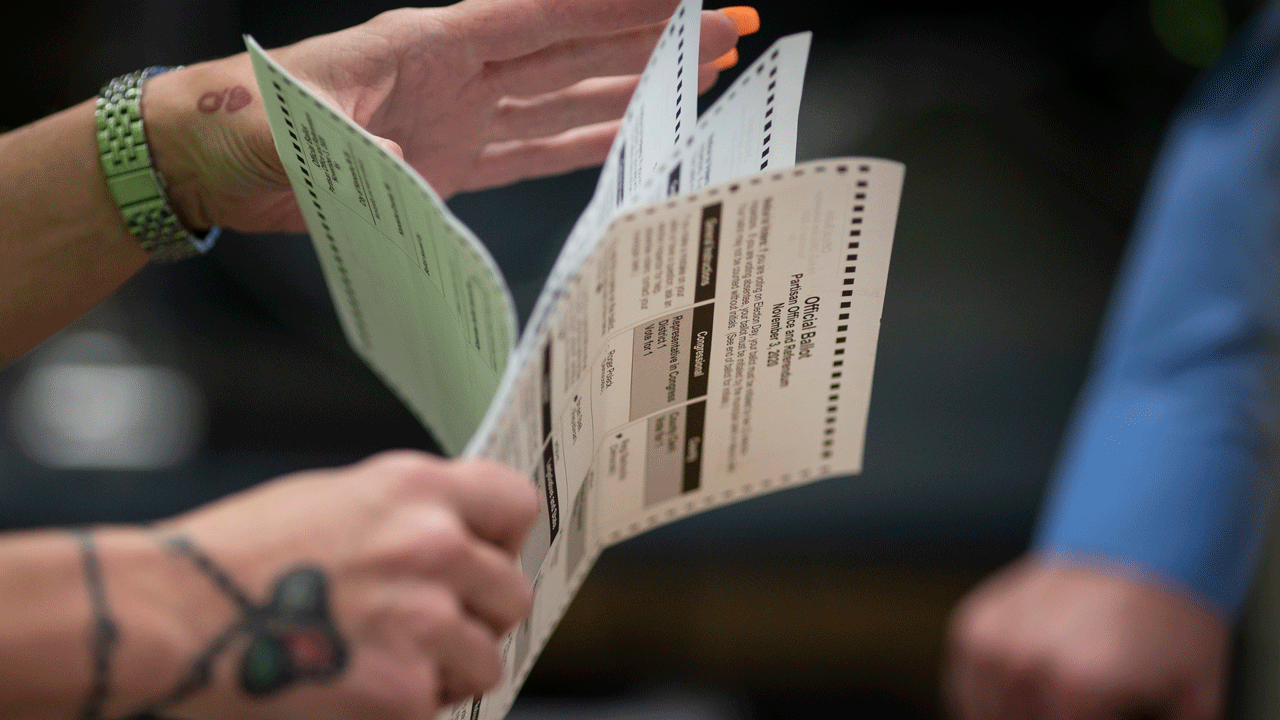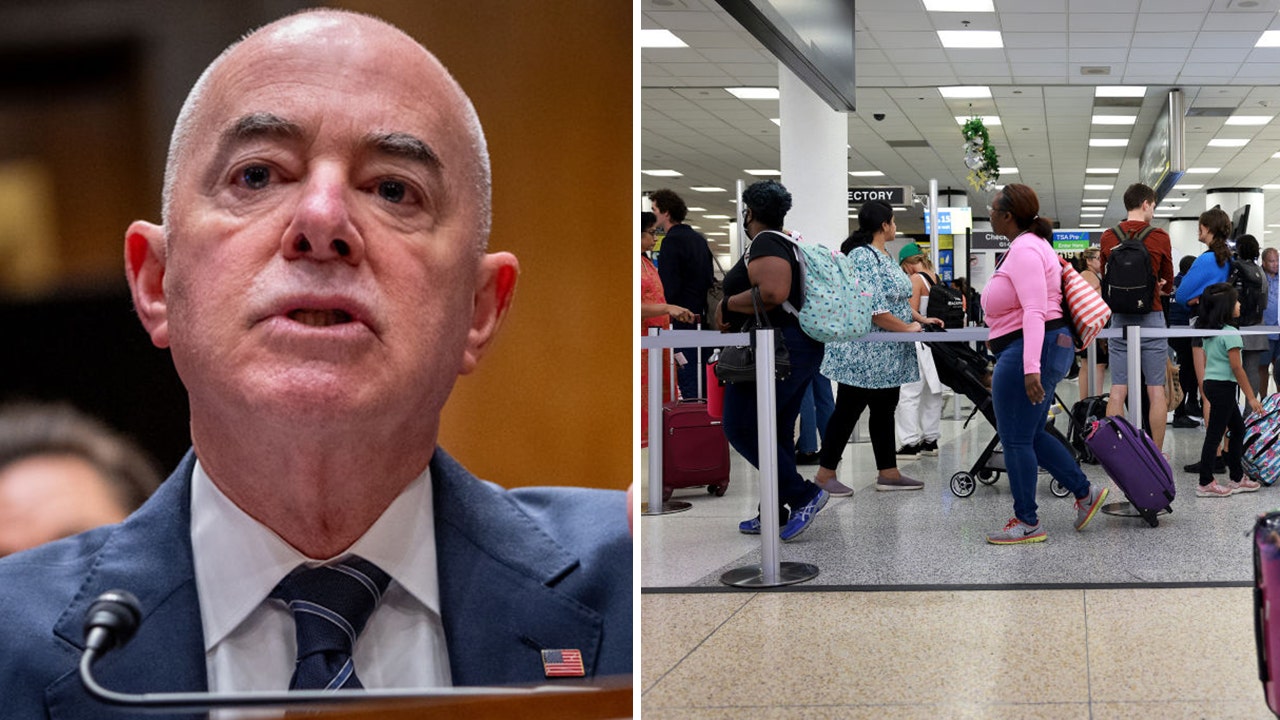Midwest
People with disabilities sue in Wisconsin over lack of electronic absentee ballots

MADISON, Wis. (AP) — Wisconsin voters with disabilities should be able to cast their ballots electronically and failure to provide that option for the upcoming Aug. 13 primary and November presidential election is discriminatory and unconstitutional, a lawsuit filed Tuesday in the battleground state alleges.
The lawsuit seeks to require that electronic absentee voting be an option for people with disabilities, just as it is for military and overseas voters. Under current Wisconsin law, people with disabilities are “treated unequally and face real and considerable hurdles to participating in absentee voting,” the lawsuit argues.
WI ELECTIONS COMMISSION APPROVES GUIDANCE, VOTERS WITH DISABILITIES CAN RECEIVE HELP WITH ABSENTEE BALLOTS
Absentee ballots, including who can return them and where, have been a political flashpoint in swing state Wisconsin, where four of the past six presidential elections have been decided by less than a percentage point. The Wisconsin Supreme Court is scheduled to hear arguments next month in a case seeking to overturn a previous ruling banning absentee ballot drop boxes.
Poll workers sort out ballots at the Kenosha Municipal building on Election Day, Nov. 3, 2020, in Kenosha, Wis. A lawsuit in Wisconsin argues that voters with disabilities should be able to cast their ballots electronically and that failing to provide that option for the upcoming Tuesday, Aug. 13, primary and November 2024 presidential election is discriminatory and unconstitutional. The lawsuit filed Tuesday, April 16, seeks to require that electronic absentee voting be an option for people with disabilities in Wisconsin, just as it is for military and overseas voters. (Wong Maye-E/AP Photo)
A federal court sided with disability rights activists in 2022 and said the Voting Rights Act applies to Wisconsin voters who require assistance with mailing or delivering their absentee ballot because of a disability. The ruling overturned a Wisconsin Supreme Court ruling that said only the voter can return their ballot in person or place it in the mail.
The new case was filed against the Wisconsin Elections Commission in Dane County Circuit Court by four voters, Disability Rights Wisconsin and the League of Women Voters. Riley Vetterkind, a spokesperson for the elections commission, declined to comment on the lawsuit.
Voters with disabilities must have the ability to vote electronically in order for Wisconsin to comply with a variety of state and federal laws related to accommodation and equal-access, the lawsuit argues. Electronic voting will also ensure that people with disabilities are treated the same as other voters, the lawsuit contends.
The lawsuit states that because absentee voting for most in Wisconsin is by paper ballot, many people with disabilities are unable to cast their votes without assistance. They could vote in private if electronic voting were an option, the lawsuit argues.
“This unconstitutional defect in Wisconsin’s absentee ballot system is well-known yet remains unaddressed,” the lawsuit alleges.
The individuals who brought the lawsuit are Donald Natzke, of Shorewood, and Michael Christopher, of Madison, both of whom are blind; Stacy Ellingen, of Oshkosh, who has cerebral palsy; and Tyler Engel, of Madison, who has spinal muscular atrophy. All four of them are unable to vote absentee privately and independently, the lawsuit argues.
The lawsuit alleges that not providing electronic absentee voting for people with disabilities violates the state and federal constitutions, the Americans with Disabilities Act and the federal Rehabilitation Act, which prohibits all organizations that receive federal financial assistance from discriminating on the basis of disability.
People with disabilities make up about one-fourth of the U.S. adult population, according to the Centers for Disease Control and Prevention. They have been ensnared in battles over access to the polls as many Republican-led states have passed restrictive voting laws in recent years, including over limits on what assistance a voter can receive and whether someone else can return a voter’s mailed ballot.
Read the full article from Here

Iowa
Lutheran Services of Iowa in need of furniture donations as they help refugees get settled in Siouxland

SIOUX CITY (KTIV) – Moving to a new city can be stressful. Now, imagine moving to a new city, in a new country, with nothing but a suitcase.
That’s a reality for refugees settling in Siouxland.
Lutheran Services in Iowa has a program helping refugees settling in the Siouxland area. It helps them find housing, jobs, transportation and anything else families may need to get started. This includes furnishing apartments and homes with basic necessities like couches, beds and tables, and, they need donations.
“We collect used furniture, gently used furniture, especially couches, loveseats, dining room sets, and then we get other household supplies that we always need for new families like cooking, cookware, dishes, cleaning products, all those types of things that families need to get started with their new life here in Iowa,” said Director of Philanthropy Eldon Bensen.
The goal is to get families settled in Siouxland, and active in their communities. LSI assists them in enrolling their children in the local school district, find medical care and whatever else they may need to live life here in Siouxland.
”They come here with whatever suitcases they brought on the plane, really,” explained Bensen. “And so all this stuff is new to them. And they only get a certain amount of money to get started with their new life. And so our goal is to get them self sufficient as quick as possible. If they’re self sufficient, that means that they’re not taking government benefits. They’re not on food stamps or Medicare, Medicaid anymore. So they’re actually contributing more than they’re bringing in after eight months of being here in the US.”
Bensen says that LSI has been helping refugees in Iowa for years, but the Sioux City chapter of LSI has only been working with the refugee resettlement program for three years. In that time, 94% of the refugees that they assisted were self-sufficient in 8 months.
“And it’s been really nice to have the opportunity to to bring these families into Siouxland, get them started, and have them contributing back to the city as soon as they possibly can,” said Bensen.
In 2023, they helped 147 refugees settle in to life in Siouxland. In order to do that, they rely on donations and volunteers.
“We’re bringing new people in with new experiences and new ways of doing life and really just benefiting Siouxland as a whole,” said Bensen. “We have a lot of people that are moving in here from all over the country. And now they’re moving in from all over the world. Just seeing the effect that it’s had on that city is really encouraging to know that that’s the type of environment that we can create when everybody works together for a common good.”
LSI doesn’t just help those settling in Siouxland, but the surrounding area as well.
Items In Need:
- Hygiene Products
- Paper Products
- Cookware
- New Bedding and Linens
- Cleaning Products
- School and Office Supplies
- Batteries
- Alarm Clocks
- Light Bulbs
If you have items to donate or would like to volunteer, you can call Lutheran Services in Iowa at 515-422-6663 or visit their website, or drop off donations during business hours at their office located at 1308 S. Cleveland St. in Sioux City.
Copyright 2024 KTIV. All rights reserved.
Kansas
Kansas attorney general concludes Junction City Commission broke open meeting law • Kansas Reflector

TOPEKA — An investigation by Kansas Attorney General Kris Kobach revealed the Junction City Commission violated the Kansas Open Meetings Act by convening a closed-door meeting to discuss an economic development project that included a livestock slaughter facility on the outskirts of the city.
Public opposition to the once-confidential project, which could have forced sale of farmland for construction of roads and a traffic exit from Interstate 70, appears to have derailed the meatpacking project that was to have been built by Foote Cattle Co.
During debate on the proposal, landowner Michelle Munson filed a two-part complaint in July 2023 with the attorney general containing allegations against the city commission.
Munson, part of the Munson Angus Farms family, said the commission didn’t take steps during a public meeting nearly three years ago to approve expenditure of $5,000 used to secure a right of first refusal for the option to buy 150 acres of real estate for the project. That land on the west side of Junction City was bought by Foote Cattle, but the city had their eyes on adjacent land owned by the Munsons.
In addition, Munson asserted the commission broke the open meetings law two years ago by failing to precisely describe the subject to be discussed in an executive session. That closed session was also about the meatpacking facility project.
Amber Smith, first assistant attorney general in Kobach’s office, issued a letter to Munson’s attorney that said the “preponderance of the evidence” indicated the commission didn’t violate KOMA while considering the $5,000 option.
However, the attorney general’s office found the commission failed to follow the law in the later meeting by trying to limit public knowledge about the project.
“We have determined the commission failed to comply with the statutory requirements for recessing into executive session because its motion did not adequately describe the subject to be discussed,” Smith aid.
She said the city attorney would be informed of the investigation’s result and the commission would be urged to take remedial action to comply with KOMA.
Munson, part of a six-generation farm family in Geary County, said the process of contesting the city’s plan to convert farmland into a manufacturing hub that included an animal slaughter facility had been time consuming and difficult.
“We’re very pleased to see that the attorney general has upheld the Kansas law in terms of transparency and sunshine on the issue,” Munson said.
Allen Dinkel, city manager for Junction City, didn’t return a call Tuesday for comment about the attorney general’s response to Munson’s complaints. In previous interviews, Dinkel said the commission’s objective was to broaden the city’s tax base by creating manufacturing and trade jobs through development of land west of the city.
Michigan
Michigan LB Hayden Moore enters transfer portal

Michigan linebacker Hayden Moore has entered the transfer portal, per multiple reports.
Moore, a three-star recruit out of Aurora, Colorado, was ranked as the No. 94 overall linebacker in the 2023 class per 247 Sports. Moore didn’t appear in a game for Michigan last season.
Michigan has now lost four linebackers to the transfer portal. Linebacker Semaj Bridgeman entered the portal on Monday, Jeremiah Beasley did last week, and Joey Velazquez transferred to Ohio State earlier this year.
Michigan’s linebacker group currently consists of names such as Ernest Hausmann and Jaishawn Barham, Jimmy Rolder, Jaydon Hood, Micah Pollard, Christian Boivin, Cole Sullivan and Jason Hewlett.
-

 Education1 week ago
Education1 week agoVideo: Dozens of Yale Students Arrested as Campus Protests Spread
-

 World1 week ago
World1 week agoEU sanctions extremist Israeli settlers over violence in the West Bank
-

 World1 week ago
World1 week agoShipping firms plead for UN help amid escalating Middle East conflict
-

 Politics1 week ago
Politics1 week ago'Nothing more backwards' than US funding Ukraine border security but not our own, conservatives say
-

 Politics1 week ago
Politics1 week agoDemocrats hold major 2024 advantage as House Republicans face further chaos, division
-

 Politics1 week ago
Politics1 week agoFetterman hammers 'a–hole' anti-Israel protesters, slams own party for response to Iranian attack: 'Crazy'
-

 World1 week ago
World1 week agoPeriod poverty still a problem within the EU despite tax breaks
-

 Politics1 week ago
Politics1 week agoA battle over 100 words: Judge tentatively siding with California AG over students' gender identification












